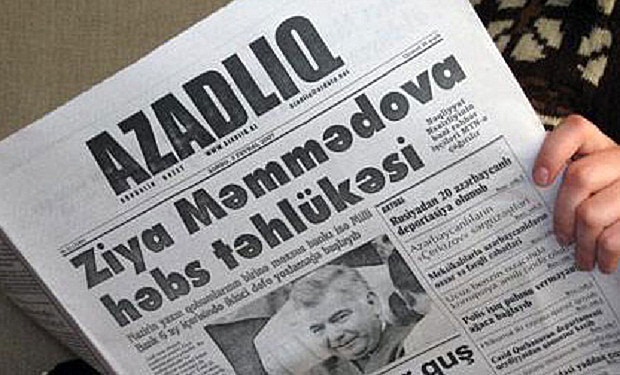
Index Award winning Azadliq newspaper was forced into cancelling its print run last week with little hope of restoring its publication.
It is not that easy to get to the editorial office of Azadliq in Baku. Once you enter the building of Azerbaijan Publishing House, a police officer, who sits close to a statue of Heydar Aliyev, the late “father of the nation” and the actual father of the incumbent president Ilham Aliyev, asks you to call the office of the newspaper to get someone to pick you up downstairs. “Everyone in Baku knows their number,” an old lady in the phone room says as she tells me how to reach Azadliq.
Rahim Haciyev, an acting editor of the daily, smiles as he greets me, and leads to the top floor of the building that looks like a shattered remnant of the Soviet past. We pass a dark and neglected corridor that seems to be last painted around 1989 – the year Azadliq was launched.
The last day of July 2014 can become the end of what was the last independent daily in Azerbaijan as it was forced into suspension of publication.
“We owe 20,000 manat (about £15,000) to the publishing house, and they refuse to print our newspaper unless we pay the debt. But we are not able to, because we don’t get money for the newspaper sales. Gasid, the state-owned press distribution company, owes us 70,000 manat (about £53,000), which should be enough to cover our debts and operation costs. Its general manager is an MP and a member of the ruling party – and they just won’t pay us,” says Rahim Haciyev.
The authorities of Azerbaijan have used economic pressure to silence one of the last critical voices in the country. Last year the newspaper was a target of defamation suits that have resulted in £52,000 in fines, which were followed by bans against selling the paper at tube stations and on the streets of Baku. Thus, Azadliq lost sales of 3,500 copies daily – and with the official distribution network refusing to pay for the copies they sell, it has resulted in a complete blockade of any revenue streams. The State Press Support Fund refused to support the paper as well.
“The authorities have tried to stifle us for a long time, and it looks like they have finally succeeded. I don’t see them letting us go back to print. The only chance is strong pressure from the West, but I don’t expect this to happen. The Western democracies are now preoccupied with weakening the influence of Russia in the region, so it is unlikely they are going to put too much pressure on its neighbouring countries,” says Haciyev.
Azadliq’s editor also sees pressuring of the paper as a part of a wider campaign of the Azerbaijani authorities aimed at silencing of the country’s civil society. Two well-known human rights defenders, Leyla Yunus and Rasul Jafarov, were arrested last week; they will be detained pending trial for three months each.
“At the moment, when repressions against the civil society and human rights activists are getting tougher, the last thing they need is a critical newspaper that spreads the word about their clampdown. And we were the last daily that reported on those cases,” Haciyev points out.
Azadliq’s editorial team keeps working, although they have not been paid for two and a half months. The paper’s website, which is one of the most popular news source online in Azerbaijan, is still updated, but nobody knows for how long.
“Azadliq” means “freedom” is Azerbaijani. There is less and less freedom in the country that looks set to take a sad lead on the number of closed down media outlets and human rights activists in jail.
This article was posted on August 4, 2014 at indexoncensorship.org




